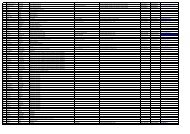View Technical Program - Levant Desalination Association
View Technical Program - Levant Desalination Association
View Technical Program - Levant Desalination Association
You also want an ePaper? Increase the reach of your titles
YUMPU automatically turns print PDFs into web optimized ePapers that Google loves.
GLOBAL WATER SHORTAGES:<br />
MEMBRANE NANOTECHNOLOGY FOR WATER RESOURCES<br />
DEVELOPMENT<br />
Professor Nidal Hilal<br />
Director of Centre for Water Advanced Technologies and Environmental Research<br />
(C WATER) - Swansea University -United Kingdom<br />
REF# IDA_DM2010-Hilal<br />
ABSTRACT<br />
The amount of currently available fresh water on earth is in continuous decline due<br />
to rapidly increased consumption as a result of population growth, industrial use<br />
and climate change. According to new findings, one in three people are enduring<br />
one form or another of water scarcity. Therefore there is an urgent need to address<br />
such world water shortages. Membrane technology increasingly proves to be one of<br />
the most practical solutions and the application of nanotechnology to membrane<br />
separation processes has shown to be extremely valuable to reduce cost and<br />
improve efficiency.<br />
The lecture will focus on the global water shortages and will show how the<br />
application of nanotechnology and in particular, Atomic Force Microscopy (AFM)<br />
to membrane separation processes, can provide us with modern tools that<br />
may be applied for further costs reduction of water. Since 1994, the research of<br />
Professor Hilal has focused on developing and applying nanotechnology to process<br />
engineering, particularly in the fields of water treatment, membrane separation,<br />
(bio)colloidal interactions and the measurement of complex fluid properties. A<br />
major recent achievement has been the development of the smallest colloid probe<br />
reported in the literature, the coated colloid probe technique and the cell probe<br />
technique. The presentation will focus on the use of such probes to quantify directly<br />
the force of interaction of coated colloid or microbiological cells in a direction normal<br />
to the membrane surface, at which the interaction is taking place. The potential<br />
of the technique has been demonstrated when such probes are used to assess<br />
the rejection of colloids at the entrance to membrane pores, and the adhesive<br />
characteristics (fouling) of synthetic membranes. The presentation will also show the<br />
recent development of AFM as a nano-viscometer.<br />
70<br />
Water Reuse and <strong>Desalination</strong>: Experience and Opportunity<br />
TECHNICAL PROGRAM




